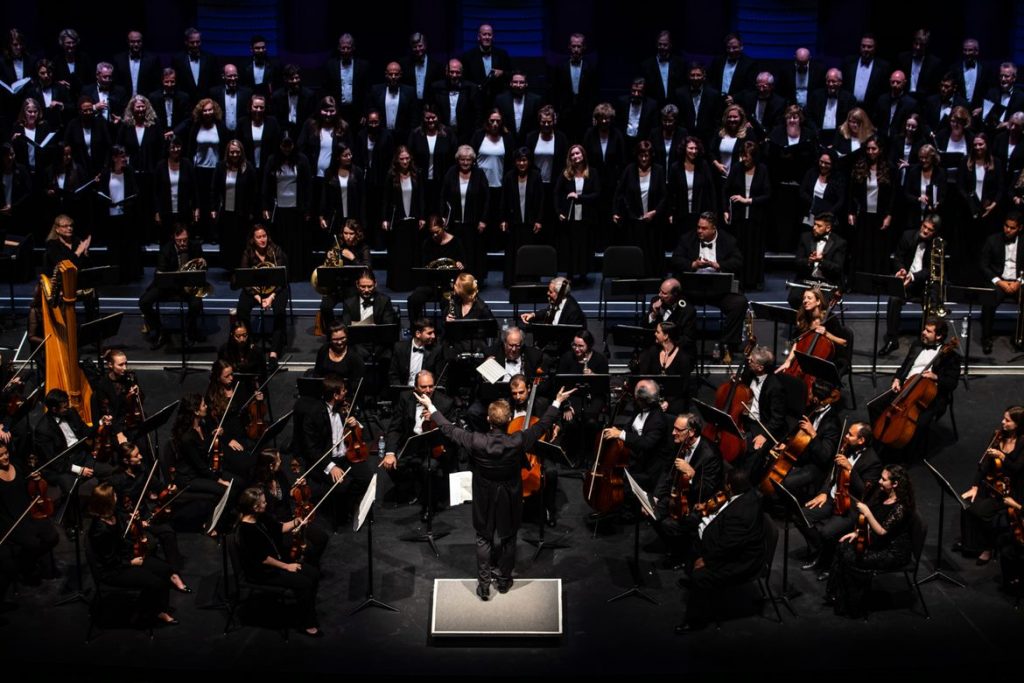
Ramón Tebar, the Palm Beach Symphony and the Master Chorale of South Florida, in performance Dec. 2 at the Kravis Center. (Photo by IndieHouse Films)
By Dennis D. Rooney
The term “Pops Concert” suggests to some a program in some way inferior to the program of a symphony orchestra, which unfortunately sometimes has been true when an orchestra is asked to play arrangements of music not originally for orchestra.
But the term also particularly applies to orchestral music of a lighter character that is not often programmed on regular season concerts. The inaugural program of the Palm Beach Symphony Orchestra’s 45th season, which took place Sunday at the Kravis Center, was titled “Symphonic Tales,” but was a true pops concert in its succession of works chosen, several drawn from opera and ballet.
Conductor Ramón Tebar opened the first half with the overture to Johann Strauss Jr.’s 1874 operetta Die Fledermaus, a work that is today often performed between Christmas and New Year’s Day despite no thematic connection with those events. The high spirits and giddiness of the plot find expression in the overture, considered the musical embodiment of Viennese effervescence. Tebar led an account that was surprisingly sober, without much gaiety.
The Dances of Galánta, by Zoltán Kodály, explore music from another part of the former Hapsburg Empire, a small town in Slovakia midway between Vienna and Budapest. The composer recalled that a Gypsy orchestra there “was the first ‘orchestral’ sonority that came to [my] ears as a child.” He used that memory and some 19th-century songbooks utilizing material from the same region to fashion a suite of five dances, which was composed for the 50th anniversary of the Budapest Philharmonic and first performed by them under conductor Ernö Dohnányi in 1933.
They explore various aspects of the Hungarian verbunkos (originally a recruiting dance), with alternating slow and fast figures alternate with highly rhythmic fast ones. A prominent solo clarinet part suggests the single-reed tárogató of Hungarian folk music. However, the folkloric elements exist within the composer’s thoroughly modern style and brilliant orchestration. The playing was colorful and atmospheric, with the final pages suitably rowdy. Kudos to the solo clarinetist, Anna Brumbaugh.
Argentine composer Alberto Ginastera’s 1941 ballet Estancia is strongly rhythmic and energetic, as befits the depiction of a gaucho’s day on a ranch in the pampas. Flutist Joseph Monticello made some lovely sounds in the Wheat Dance, second in the suite, but muscularity was prominent elsewhere, especially in the finale, “Malambo.”
Il segreto di Susanna is a one-act opera by Ermanno Wolf-Ferrari in which the “secret” is that the heroine smokes. Today, interest in the work subsists only in the overture, which opened this concert’s second half. Its diaphanous textures and sprightliness were expertly brought off.
“Polovtsy” is the Russian name given to two Turkic tribes also known as Kipchaks and Cumans. The “Polovtsian Dances” occur and the end of Act II of Prince Igor, an opera by Alexander Borodin left unfinished at his death in 1887. As orchestrated by Rimsky-Korsakov and fashioned into a concert suite, they became popular concert fare; however, in 1953 their melodies and several others by the composer were fashioned into the musical comedy Kismet, which brought an entirely different dimension to the orientalism of the original.
This performance of the Polovtsian Dances had the Master Chorale of South Florida (Brett Karlin, director) placed behind the orchestra on the Dreyfoos Hall stage. They sang with verve and accuracy, although whatever they sang was unintelligible in whatever language they chose. Against the choral textures, Rimsky’s orchestration lent additional tonal splendor.
What better choice to close a pops concert than the Suite from Tchaikovsky’s pageant ballet The Sleeping Beauty? Where Rimsky’s orchestra glitters brazenly in the Polovtsian Dances, Tchaikovsky’s sparkles, although this performance favored the bright, occasionally acrid colors of woodwinds and brass, making the sound less lush than usual for this composer. The performance was energetic and, in the concluding Valse, had the necessary romantic sweep.